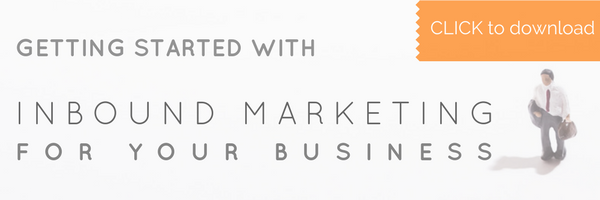4 Months, 9 days, and 23 hours ago I held my breath as I hit "publish" to my first full-blown inbound marketing strategy, represented by the launching of Orange Pegs Media's brand-new integrated website and 6 parallel inbound campaigns.
Taking this step was a big deal for my young b2b marketing solutions agency, because prior to that I was a specialty social media marketing & management company. I decided to make the change and go all in with Hubspot and inbound marketing after performing about 12 months of due diligence while running my social media agency. Why did I decide to make the change? Simple. Like many of you reading this blog, I was tired of getting little return for my enormous marketing investments.
Now, don't get me wrong. Social media is still at the top of my list for small business marketing strategies, something I talk about it a lot in my blog, and provide detailed guidance for in my learning center... but as a standalone service offering, the social media management pricing structure wasn't matching up with its desired output.
And now that I have transitioned and put the first trimester of full-blooded inbound marketing behind me, I decided that it was time to take pause and reflect on what led to this amazing journey.
 IT'S MORE MORE IMPORTANT THAN YOU MAY REALIZE:
IT'S MORE MORE IMPORTANT THAN YOU MAY REALIZE:
I know many of you are looking to change they way you market your company, because the "old ways" are no longer paying off like they used to.
With my own agency I knew early on that social media as a standalone service wasn't going to ultimately help me achieve the kind of growth I had in mind, so I spent a tremendous amount of time talking to other marketers, agencies, and consultants, whether in-person or online, to try and find answers. I spoke to business owners and heads of marketing departments interested in my services, and took every opportunity I had to try and understand the problem in greater detail and find viable solutions that worked for others.
I spent literally hundreds of hours performing due diligence and even sought guidance from SCORE, a subdivision of the Small Business Administration.
Whether the outcome was positive or negative, with every discussion, article, referral, opportunity, engagement, brush-off, or dead-end I encountered, I was led to these same inevitable and powerful conclusions:
- Business owners are tired of marketing that doesn't clearly and directly pay for itself - of being "convinced" that it's working, and of not feeling like they're ultimately in control of the outcome.
- New-age specialty digital marketing services like social media and blogging make them nervous, because they don't understand them from a buyer's perspective.
- Marketers everywhere are going through identity crisis', because digital is nothing like it was a couple of years ago.
Then there's this thing I kept running into called "inbound marketing," and its biggest advocate, outside of the agencies that seem to be pulling it off, was this software company called Hubspot.
So, after what seemed like a lifetime of due diligence, I swallowed the hefty price tag of the Hubspot Pro subscription package and its required training modules, and put everything I had into this extraordinary conversion. Now, after 4 months, 9 days, and 23 hours, I get to share with you what I learned, so you can see first-hand how important this new method of marketing is for your business
1. It Requires a Mini MBA

Inbound is no joke. It is not just one, but MULTIPLE digital marketing tools that are so complex that they historically operated independently of one another within the context of both businesses and agencies.
Think about it. SEO is often sent to IT or the web designers. Social media ends up in the hands of individual sales reps, corporate marketers, or interns. Content creation belongs to the marketers. Email campaigns are often split between individual sales reps and the marketing department. And blogging... well, sometimes it goes to consultants.... sometimes it's used as an advertising forum by marketers... usually it's nowhere to be found.
Being a full-suite inbound marketing agency means pulling knowledge and expertise from a diverse set of service offerings, so going all in certainly made me nervous, given the fact that I had spent the better part of my 10 year b2b sales career mastering social media and sales... not everything else.
But the education received in the training process met my fears head-on. They accounted for dozens of hours of recorded trainings, doubling down for the live online classes, and double again for the implementation and PRACTICUM requirements. Seriously, it was like a mini-MBA.
2. Collaboration is Key
Logic and creativity are not easy to fuse together, and very few people possess both qualities.. They're two different sides of the same coin - or two different sides of the same brain, and most people are typically able to tap into one or the other, but not both.
But inbound IS both, and to make it work, you MUST find a way to fuse them together. Collaboration, in my opinion, is the path of least resistence to succeeding with an inbound marketing campaign, and I think most of you would agree that we are more powerful when we work with people who are better than us in some capacity or another - regardless of the project.
3. It's as Logical as it is Creative

There are logical lead conversion paths that we must follow and use in order for inbound marketing to work. Hubspot provides an incredible closed-loop marketing toolset for this, but they don't do the actual marketing for you. That's on the customers who buy their software subscriptions or the agencies they hire to do it for them.
In talking to business owners and other agencies who have purchased the program, the common frustration I saw (when there was one) is that they did not realize how far out of their comfort zone they would have to travel to pull it off. I think Hubspot realizes this too, which is probably why they put so much into their educational process, not just focusing on the tools, but the philosophy and execution as well.
I think a great example of this creative/logic fusion is with blogging. The best blog ideas are those that provide insight and teach their audiences something using real-life examples to do so, in a story-telling manner. There are also basic blog formats that are known for their effectiveness, so already, we're combining creativity with formulaic execution.
But it doesn't end there. When you're trying to figure out what to blog about you turn to your integrated keyword strategy... and distribution through social media is as much of an art as it is a science.
4. Success Doesn't Happen Overnight
I'll admit, I was expecting confetti to fall when I hit the button to publish my new, inbound marketing campaign. In fact, I lined up a pretty heavy PPC ad campaign to run in parallel of my launch, thinking I would short-cut the ramp-up period by several months, and I came out of the gate with 6 pieces of premium, downloadable content to drive the lead conversions. Today, we have close to 20...
My first month was by far and away my most successful in terms of driving traffic, with 4,765 visitors. Of course, I spent $1,000 on PPC ads with Google & Bing to get there, but it wasn't bad because I generated leads for the first time through my website. Ever... But when I cut the ad budget in half the following month my traffic dropped by more than 65%, down to 1,429. Then on the 3rd month, I cut it again, and it dropped again...
Here it is now in month 5, and...
5. You May have to Reinvent Yourself 2 or 20 times
I reinvented myself in that 4 month period more times than I can count. I analyzed every report until I went cross-eyed, looking for every hole I could find in the logic, creativity, and execution of my campaign. I revamped my content and personas, and nearly tripled my downloadable offers, but also reinvented my list segmentation logic, and completely stripped away and rebuilt my entire workflow architecture.
apologize if this is too much jargon for you, so let's just say that I essentially rebuilt my campaign 20 times without ever taking my foot off the gas.
If a page was getting traffic but no conversions, I reinvented that page and the paths people had to take to get to it until that percentage went up. I analyzed keywords that were driving visitors that actually converted, and scrutinized each lead that came in to make sure they were the kind of lead I wanted. I even experimented with gating free email addresses.
I've been blogging 2-3 times per week since the launch with the exception of the major holiday weeks, and I follow very strict social media and email protocols set forth by the scientific minds of Hubspot's training program. I took the advice of my Hubspot channel rep to focus in on the industry niches I know best, and built entire content marketing campaigns around them. I even altered my emails with smart content based on those industries.
The next question is, will I have to reinvent myself a 21st time? Probably, but that's the nature of interactive marketing, isn't it?
THEN SOMETHING AMAZING HAPPENED.
The tireless efforts and sleepless nights. The hours upon hours of marketing strategy iterations - all finally worked, and exactly 4 months, 9 days, and 23 hours after the day I held my breath and hit that "publish" button, I wrote this blog to let you all know that it's "time to strap on the party hat, because it's about to get crazy!" (to paraphrase one of my favorite Regional Sales Managers of all time)



